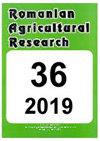The Impact of Climate Change and Genetic Progress on Performance of Old and Recent Released Maize Hybrids Created at the ARDS Turda
IF 1
4区 农林科学
Q3 AGRONOMY
引用次数: 1
Abstract
Climate change effects on maize performance have been already detectable during the last twenty years in many parts of the world. This study aims to assess the relationship between climatic factors and maize yield, grain moisture at harvest and resistance of plants to broken and stalk lodging, with reference to maize hybrids created at the Agricultural Research and Development Station Turda (ARDS), in the centre area of Romania. The purpose of this study was to detect trends in the yield ability of 35 maize hybrids (18 historical and 17 recently released) and the possible association with weather trends. A significant increase in temperature both during vegetative growth and grain filling was observed, while rainfall presented a decrease in the critical period of flowering and grain-filling, during the last two decades (2000-2020), with large year to year variations. During the analyzed period, yields of the historical hybrids showed a reduction trend from -72 kg/ha/year for FAO groups 210-300, to -272 kg/ha/year for FAO groups over 300. The average yield of recently released hybrids showed an increasing trend from +91 kg/ha/year for FAO 300-hybrids, to +215 kg/ha/year for FAO groups 210-300. This suggests that genetic progress reflected in the release of new maize hybrids was able to counteract the negative effect of climate change seen on the yield of the historical hybrids. The yield difference between recently released hybrids and the historical ones showed the rate of genetic progress of +171 kg/ha/year for very early hybrids, +116 kg/ha/year for early hybrids, and +275 kg/ha/year for semi-early hybrids.气候变化和遗传进展对在ARDS Turda培育的新旧玉米杂交种性能的影响
在过去的二十年里,气候变化对玉米生产性能的影响已经在世界许多地方被发现。这项研究的目的是评估气候因素与玉米产量、收获时谷物水分以及植物对断茎和倒伏的抗性之间的关系,研究对象是罗马尼亚中部地区Turda农业研究与发展站(ARDS)培育的玉米杂交品种。本研究的目的是检测35个玉米杂交品种(18个历史品种和17个新品种)的产量趋势及其与天气趋势的可能关联。近20年(2000-2020年),植物营养生长期和灌浆期气温均显著升高,而开花灌浆关键期雨量则呈减少趋势,且年际变化较大。在分析期间,历史杂交品种的产量呈下降趋势,粮农组织210-300组产量为-72公斤/公顷/年,粮农组织300以上组产量为-272公斤/公顷/年。最近发布的杂交品种的平均产量呈现上升趋势,从粮农组织300品种的+91公斤/公顷/年增加到粮农组织210-300品种的+215公斤/公顷/年。这表明,新玉米杂交品种的释放所反映的遗传进步能够抵消气候变化对历史杂交品种产量的负面影响。最近发布的杂交品种与历史品种的产量差异表明,极早杂交品种的遗传进展率为+171 kg/ha/年,早期杂交品种为+116 kg/ha/年,半早杂交品种为+275 kg/ha/年。
本文章由计算机程序翻译,如有差异,请以英文原文为准。
求助全文
约1分钟内获得全文
求助全文
来源期刊

Romanian Agricultural Research
农林科学-农艺学
CiteScore
0.90
自引率
28.60%
发文量
2
审稿时长
>12 weeks
期刊介绍:
The Journal ROMANIAN AGRICULTURAL RESEARCH is an “open access” one, which publishes original articles, short communications, presenting new scientific results – theoretical, experimental and technical – on plant breeding and genetics, physiology, biotechnology, mineral nutrition and plant protection, in field crops. Reviews on up-to date subjects and recent research, preferably from Eastern Europe, may also be published.
 求助内容:
求助内容: 应助结果提醒方式:
应助结果提醒方式:


